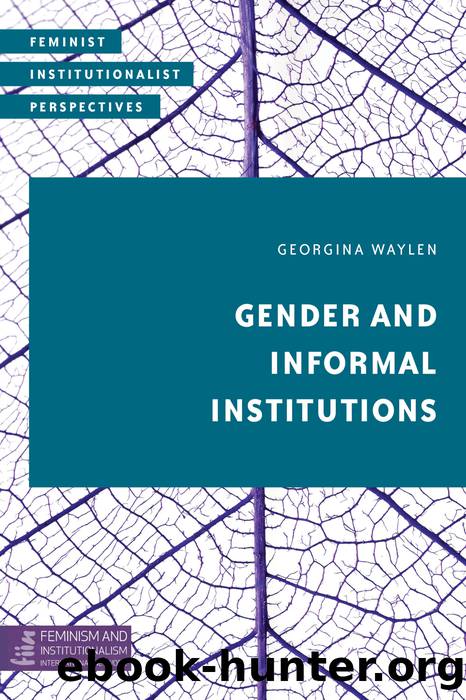Gender and Informal Institutions by Waylen Georgina;

Author:Waylen, Georgina;
Language: eng
Format: epub
ISBN: 4854088
Publisher: Rowman & Littlefield Unlimited Model
INFORMALITY, INFORMAL RULES AND GENDER IN CHILEâS EXECUTIVE BRANCH
Chileâs constitution is often described as strongly presidentialist, concentrating extensive formal powers in the executive branch (Shugart and Carey 1992; Siavelis 2000). Although both branches of government enjoy the formal right to introduce legislation, there are restrictions on the type of bills that members of Congress may introduce, and the executive has vast agenda-setting powers. The constitution prevents members of Congress from introducing bills that involve spending or that affect the budget, and the executive is formally empowered to declare âurgenciesâ that have the effect of fast-tracking committee and full-chamber discussion of a bill. The executive branch also possesses far greater resources in the legislative process, namely, access to congressional committees and greater human and technical resources (Haas 2010). In addition to its formal legislative powers, the president enjoys extensive powers of appointment, filling hundreds of posts throughout the state. What is more, the presidentâs appointments need not be confirmed by another political branch, as do high court judges or cabinet ministers in the United States. Finally, the executiveâs rule-making powers include regulatory decrees: All laws passed by Congress require executive regulations that spell out how the laws are to be implemented. Notably, Congress cannot oversee policy implementation, and even if the executive is supposed to ensure that the regulatory decrees are in keeping with the spirit of the laws adopted by Congress, there is no mechanism for ensuring such correspondence (MartÃnez-Gallardo 2010). In brief, the formal powers of the Chilean executive are vast.
Yet the Chilean political institutionsâ formal rules are a poor guide for understanding how and why political actors behave the way they do. This is because, in addition to the formal rules, myriad entrenched informal rules guide political action. Most important, some of the informal rules have the effect of mitigating the concentration of power in the executive branch. Peter Siavelis (2006) shows that while the constitution concentrates great formal power in the executive, a series of informal institutions have developed to constrain presidents. Two of the informal rules of post-transition Chilean politics have profound gendered consequences. The first is the practice of consensus seeking, or âpolitics by agreementâ. According to this rule, presidents must seek consensus among the parties of the governing coalition,2 and sometimes even with key opposition political actors, before formally introducing a new policy issue on the agenda. The other relevant informal rule governs executive recruitment. This is the practice of distributing posts proportionally across the parties of the coalition (see Siavelis 2006). Both rules aim to maintain coalition unity but have the effect of constraining presidents, particularly when it comes to appointing cabinet ministers and other top executive offices (like sub-secretaries, governors and intendants). Taken together, these informal rules affect recruitment to executive offices as well as the way that the executive branch actually functions, specifically, where power and policymaking influence are located. Both rules are gendered in ways that create opportunities and obstacles to women and to the pursuit of feminist policy goals.
Download
This site does not store any files on its server. We only index and link to content provided by other sites. Please contact the content providers to delete copyright contents if any and email us, we'll remove relevant links or contents immediately.
The Secret History by Donna Tartt(16664)
The Social Justice Warrior Handbook by Lisa De Pasquale(11494)
Thirteen Reasons Why by Jay Asher(7803)
This Is How You Lose Her by Junot Diaz(5800)
Weapons of Math Destruction by Cathy O'Neil(5049)
Zero to One by Peter Thiel(4836)
The Myth of the Strong Leader by Archie Brown(4796)
Promise Me, Dad by Joe Biden(4459)
Beartown by Fredrik Backman(4435)
Stone's Rules by Roger Stone(4423)
How Democracies Die by Steven Levitsky & Daniel Ziblatt(4416)
The Fire Next Time by James Baldwin(4352)
100 Deadly Skills by Clint Emerson(4087)
A Higher Loyalty: Truth, Lies, and Leadership by James Comey(4041)
Rise and Kill First by Ronen Bergman(4023)
The David Icke Guide to the Global Conspiracy (and how to end it) by David Icke(3892)
The Farm by Tom Rob Smith(3878)
Secrecy World by Jake Bernstein(3790)
The Doomsday Machine by Daniel Ellsberg(3738)
